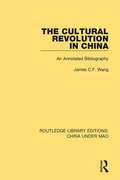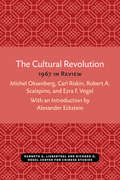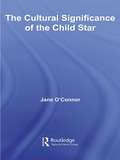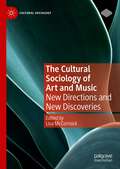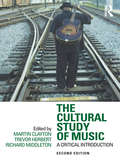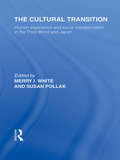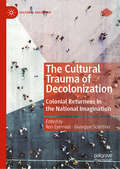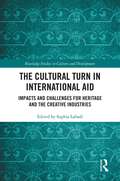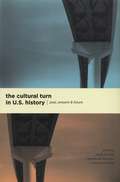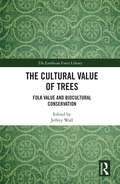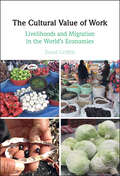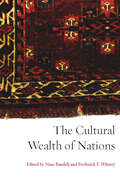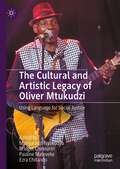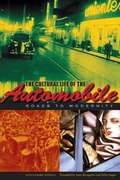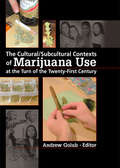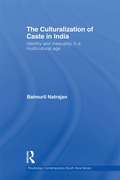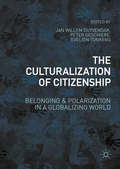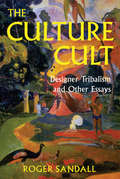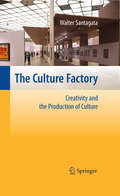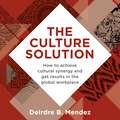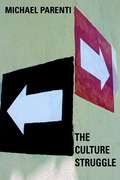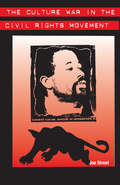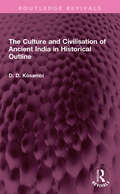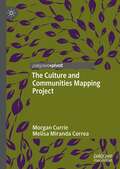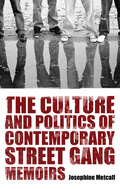- Table View
- List View
The Cultural Revolution in China: An Annotated Bibliography (Routledge Library Editions: China Under Mao #8)
by James C.F. WangThe Cultural Revolution in China generated a cascade of commentaries and interpretations on the development and meaning of the upheaval. Many students and researchers have found it difficult to locate and identify literature on the period. This bibliography, first published in 1976, corrects this situation. It lists all books, monographs and journal articles in English on the Cultural Revolution, each annotated to show its relevance – a vital reference source.
The Cultural Revolution: 1967 in Review (Michigan Monographs In Chinese Studies #2)
by Ezra F. Vogel Michel Oksenberg Carl RiskinThe Chinese Communist system was from its very inception based on an inherent contradiction and tension, and the Cultural Revolution is the latest and most violent manifestation of that contradiction. Built into the very structure of the system was an inner conflict between the desiderata, the imperatives, and the requirements that technocratic modernization on the one hand and Maoist values and strategy on the other. The Cultural Revolution collects four papers prepared for a research conference on the topic convened by the University of Michigan Center for Chinese Studies in March 1968. Michel Oksenberg opens the volume by examining the impact of the Cultural Revolution on occupational groups including peasants, industrial managers and workers, intellectuals, students, party and government officials, and the military. Carl Riskin is concerned with the economic effects of the revolution, taking up production trends in agriculture and industry, movements in foreign trade, and implications of Masoist economic policies for China’s economic growth. Robert A. Scalapino turns to China’s foreign policy behavior during this period, arguing that Chinese Communists in general, and Mao in particular, formed foreign policy with a curious combination of cosmic, utopian internationalism and practical ethnocentrism rooted both in Chinese tradition and Communist experience. Ezra F. Vogel closes the volume by exploring the structure of the conflict, the struggles between factions, and the character of those factions.
The Cultural Significance of the Child Star (Routledge Advances in Sociology)
by Jane Catherine O'ConnorThe child star is an iconic figure in Western society representing a growing cultural trend which idolises, castigates and fetishises the image of the perfect, innocent and beautiful child. In this book, Jane O’Connor explores the paradoxical status of the child star who is both adored and reviled in contemporary society. Drawing on current debates about the commercialisation and sexualisation of childhood and fears about children ‘growing up too soon’, she identifies hostile media attention around child stars as indicative of broader social concerns about the ‘correct’ role and place of children in relation to normative ideals of childhood. Through reference to extensive empirical examples of the way child stars such as Shirley Temple, Macaulay Culkin, Charlotte Church and Jackie Coogan have been constructed in the media, this book illustrates both the powerlessness and the power held by this tiny band of children, and demonstrates their significance as representatives of the public face of childhood throughout the twentieth century and beyond.
The Cultural Sociology of Art and Music: New Directions and New Discoveries (Cultural Sociology)
by Lisa McCormickThis edited collection develops the Strong Program’s contribution to the sociological study of the arts and places it in conversation with other cultural perspectives in the field. Presenting some of the newest and most original research by both renowned figures and early career scholars, the volume marks a new stage in the development of the cultural sociology of art and music. The chapters in Part 1 set new agendas by reflecting on the field’s history, presenting theoretical innovations, and suggesting future directions for research. Part 2 explores aesthetic issues and challenges in the creation, experience, and interpretation of art and music. Part 3 focuses on the material environments and social settings where people engage with art and music. In Part 4, the contributors examine controversies about music and contestation over artistic matters, whether in the public sphere, in the American judicial system, or in an emerging academic discipline. The editor’s introduction and Ron Eyerman's afterword place the chapters in context and reflect on their collective contribution to meaning-centered sociology.
The Cultural Study of Music: A Critical Introduction
by Trevor Herbert Richard Middleton Martin ClaytonWhat is the relationship between music and culture? The first edition of The Cultural Study of Music: A Critical Introduction explored this question with groundbreaking rigor and breadth. Now this second edition refines that original analysis while examining the ways the field has developed in the years since the book’s initial publication. Including contributions from scholars of music, cultural studies, anthropology, sociology, and psychology, this anthology provides a comprehensive introduction to the study of music and culture. It includes both pioneering theoretical essays and exhaustively researched case studies on particular issues in world musics. For the second edition, the original essays have been revised and nine new chapters have been added, covering themes such as race, religion, geography, technology, and the politics of music. With an even broader scope and a larger roster of world-renowned contributors, The Cultural Study of Music is certain to remain a canonical text in the field of cultural musicology.
The Cultural Transition: Human Experience and Social Transformation in the Third World and Japan (Routledge Library Editions: Japan)
by Meery I. WhiteThis volume makes available a wide variety of cultural perspectives on education and on economic and social progress. Contributors focus on three main questions, the answers to which are vital for understanding the needs of both national policy and personal fulfilment in widely differing cultures. The contributors examine the concept of the self that underlies the idea of virtue which facilitates learning in Japan, the Confucian-style bonding between generations in Chinese society and the authority of the traditional teacher with the modern Quaranic School. They study phenomena as diverse as the effect of Christian and Islamic influence on the native cultures of Africa, and the life strategies of Japanese business women, spanning a geographical range from Morocco to Fiji.
The Cultural Trauma of Decolonization: Colonial Returnees in the National Imagination (Cultural Sociology)
by Ron Eyerman Giuseppe SciortinoThis volume is first consistent effort to systematically analyze the features and consequences of colonial repatriation in comparative terms, examining the trajectories of returnees in six former colonial countries (Belgium, France, Italy, Japan, the Netherlands, and Portugal). Each contributor examines these cases through a shared cultural sociology frame, unifying the historical and sociological analyses carried out in the collection. More particularly, the book strengthens and improves one of the most important and popular current streams of cultural sociology, that of collective trauma. Using a comparative perspective to study the trajectories of similarly traumatized groups in different countries allows for not only a thick description of the return processes, but also a thick explanation of the mechanisms and factors shaping them. Learning from these various cases of colonial returnees, the authors have been able to develop a new theoretical framework that may help cultural sociologists to explain why seemingly similar claims of collective trauma and victimhood garner respect and recognition in certain contexts, but fail in others.
The Cultural Turn in International Aid: Impacts and Challenges for Heritage and the Creative Industries (Routledge Studies in Culture and Development)
by Sophia LabadiThe Cultural Turn in International Aid is one of the first volumes to analyse a wide and comprehensive range of issues related to culture and international aid in a critical and constructive manner. Assessing why international aid is provided for cultural projects, rather than for other causes, the book also considers whether and how donor funded cultural projects can address global challenges, including post-conflict recovery, building peace and security, strengthening resilience, or promoting human rights. With contributions from experts around the globe, this volume critically assesses the impact of international aid, including the diverse power relations and inequalities it creates, and the interests it serves at international, national and local levels. The book also considers projects that have failed and analyses the reasons for their failure, drawing out lessons learnt and considering what could be done better in the future. Contributors to the volume also consider the influence of donors in privileging some forms of culture over others, creating or maintaining specific memories, identities, and interpretations of history, and their reasons for doing so. These rich discussions are contextualised through a historical section, which considers the definitions, approaches and discourses related to culture and aid at international and regional levels. Providing consideration of manifold manifestations of culture, The Cultural Turn in International Aid will be of great interest to scholars, students and practitioners. It will be particularly useful for those engaged in the study of heritage, anthropology, international aid and development, international relations, humanitarian studies, community development, cultural studies, politics or sociology.
The Cultural Turn in U.S. History
by James W. Cook Michael O'Malley Lawrence B. GlickmanA definitive account of one of the most dominant trends in recent historical writing, The Cultural Turn in U. S. History takes stock of the field at the same time as it showcases exemplars of its practice. The first of this volume’s three distinct sections offers a comprehensive genealogy of American cultural history, tracing its multifaceted origins, defining debates, and intersections with adjacent fields. The second section comprises previously unpublished essays by a distinguished roster of contributors who illuminate the discipline’s rich potential by plumbing topics that range from nineteenth-century anxieties about greenback dollars to confidence games in 1920s Harlem, from Shirley Temple’s career to the story of a Chicano community in San Diego that created a public park under a local freeway. Featuring an equally wide ranging selection of pieces that meditate on the future of the field, the final section explores such subjects as the different strains of cultural history, its relationships with arenas from mass entertainment to public policy, and the ways it has been shaped by catastrophe. Taken together, these essays represent a watershed moment in the life of a discipline, harnessing its vitality to offer a glimpse of the shape it will take in years to come.
The Cultural Value of Trees: Folk Value and Biocultural Conservation (The Earthscan Forest Library)
by Jeffrey WallThis volume focuses on the tree, as a cultural and biological form, and examines the concept of folk value and its implications for biocultural conservation. Folk value refers to the value of the more-than-human living world to cultural cohesion and survival, as opposed to individual well-being. This field of value, comprising cosmological, aesthetic, eco-erotic, sentimental, mnemonic value and much more, serves as powerful motivation for the local performance of environmental care. The motivation to maintain and conserve ecology for the purpose of cultural survival will be the central focus of this book, as the conditions of the Anthropocene urgently require the identification, understanding and support of enduring, self-perpetuating biocultural associations. The geographical scope is broad with chapters discussing different tree species from the Americas and the Caribbean, East Asia, Eurasia and Australia and Africa. By focusing on the tree, one of the most reliably cross-culturally-valued and cross-culturally-recognized biological forms, and one which invariably defines expansive landscapes, this work illuminates how folk value binds the survival of more-than-human life forms with the survival of specific peoples in the era of biocultural loss, the Anthropocene. As such, this collection of cross-cultural cases of tree folk value represents a low hanging fruit for the larger project of exploring the power of cultural value of the more-than-human living world. This book will be of great interest to students and scholars of conservation, biodiversity, biocultural studies and environmental anthropology.
The Cultural Value of Work: Livelihoods and Migration in the World's Economies
by David GriffithTraditional wage labor has experienced a significant decline in industrialized countries over the past few decades. The spread of temporary work, the proliferation of subcontracting arrangements, the use of artificial intelligence (AI), the shipment of manufacturing jobs overseas, and the employment of foreign contract workers are among the key factors driving this decline. The result is a rise of labor insecurity and fragmentation among increasingly diverse forms of flexible labor arrangements. This book examines this important transformation by considering the impact of foreign contract labor on temporary migrant workers in their places of employment and home communities. It assesses work as a source of value in capitalist, reproductive, domestic, and cultural economics, and argues for a new, work-centric field of economics. Rich in examples, it is a sophisticated anthropological appreciation of the many forms that work can take and what these forms mean for the creation of value in people's lives.
The Cultural Wealth of Nations
by Nina Bandelj Frederick F. WherrySymbolic resources affect social, cultural, and economic development. The value of being "Made in America" or "Made in Italy," for example, depends not only on the material advantages each place offers but also on the symbolic resources embedded in those places of production. Drawing on case studies that range from the vineyards of South Africa and the textiles of Thailand to the Mundo Maya in Latin America and tourist destinations in Tuscany, this volume examines the various forms that cultural wealth takes, the processes involved in its construction, and the ways it is deployed. Leading scholars from a range of disciplinary backgrounds examine how symbolic resources and cultural understandings help firms and regions develop. Through a thoughtful analysis of current- day cases, as well as historical developments,The Cultural Wealth of Nationsoffers an exciting new alternative to standard economic explanations about the wealth and poverty of nations.
The Cultural and Artistic Legacy of Oliver Mtukudzi: Using Language for Social Justice
by Ezra Chitando Pauline Mateveke Munyaradzi Nyakudya Bridget ChinouririThis book delves into a critical and comprehensive analysis of Mtukudzi’s legacy, as an outstanding musician who anchored his music on cultural identity specifically through the artistic manipulation of language. As a cultural worker, his remit extended beyond performance. This raised his stature to the levels of such African music icons as Fela Kuti of Nigeria, Salif Keita of Mali and Miriam Makeba/Hugh Masekela of South Africa, all towering giants in African musical performance. This volume examines how Mtukudzi artistically manipulated language to convey a timeless message of cultural identity, fighting for the respect of rights for women, children and all. It unpacks how Mtukudzi subtly uses language to put across political views that speak truth to power, harnessing Zimbabwean language to articulate and promote the nation’s cultural heritage and to advocate for societal development and the promotion of rights of vulnerable groups.The chapters in this volume are a mix of interdisciplinary Zimbabwean scholars of linguistics, performance studies, religion, history, communication and media studies, unravelling Mtukudzi as a fighter for human rights and justice who subtly critiqued political systems and practices. It concludes that Mtukudzi strove to be a cultural worker who used the power of language through music to contribute towards the rehabilitation of a battered African identity.
The Cultural life of the Automobile: Roads to Modernity
by Guillermo GiucciFrom its invention in Europe at the end of the nineteenth century, the automobile crisscrossed the world, completely took over the cities, and became a feature of daily life. Considered basic to the American lifestyle, the car reflected individualism, pragmatism, comfort, and above all modernity. In Latin America, it served as a symbol of distinction, similar to jewelry or fine clothing. In The Cultural Life of the Automobile, Guillermo Giucci focuses on the automobile as an instrument of social change through its "kinetic modernity" and as an embodiment of the tremendous social impact of technology on cultural life. Material culture-how certain objects generate a wide array of cultural responses-has been the focus of much scholarly discussion in recent years. The automobile wrought major changes and inspired images in language, literature, and popular culture. Focusing primarily on Latin America but also covering the United States, Europe, Asia, and Africa, Giucci examines how the automobile was variously adapted by different cultures and how its use shaped and changed social and economic relationships within them. At the same time, he shows how the "automobilization" of society became an essential support for the development of modern individualism, and the automobile its clearest material manifestation.
The Cultural/Subcultural Contexts of Marijuana Use at the Turn of the Twenty-First Century
by Andrew GolubLearn why marijuana use has increased in the new millenniumAccording to the Substance Abuse and Mental Health Services Administration, marijuana is the most commonly used illicit drug. The Cultural/Subcultural Contexts of Marijuana Use at the Turn of the Twenty-First Century takes a close look at present cannabis use trends in the new millennium by providing the latest research findings and most current case studies. Age and ethnographic data are presented in detail always with a constant focus on the unique subcultural contexts in today&’s society. This examination explores the most pressing issues in marijuana use, including the increased popularity of blunt smoking, the social ramifications of marijuana use in gangs and Southeast Asian youth, and alternative delivery systems for medical marijuana.The Cultural/Subcultural Contexts of Marijuana Use at the Turn of the Twenty-First Century discusses various aspects of marijuana being the drug of choice in today&’s culture, including the different subgroups of age, economic status, and ethnic background. The book provides a comprehensive view of the people, reasons for use, varied ways of ingesting the drug, and marijuana use "rituals." Extensive references, charts, tables, and figures are included to enhance clarification of research findings.The Cultural/Subcultural Contexts of Marijuana Use at the Turn of the Twenty-First Century discusses the latest research findings on: the growth of marijuana use in different social groups during the 1990s medical marijuana blunt smoking and marijuana use rituals as settings for informal social controls marijuana use among minorities marijuana use in youths and young adults marijuana use among gang members adult use production, distribution, and administration of non-smokable marijuanaThe Cultural/Subcultural Contexts of Marijuana Use at the Turn of the Twenty-First Century is insightful, valuable, and is certain to become a reference source for researchers, educators, students, and policy advocates.
The Culturalization of Caste in India: Identity and Inequality in a Multicultural Age (Routledge Contemporary South Asia Series)
by Balmurli NatrajanIn India, caste groups ensure their durability in an era of multiculturalism by officially representing caste as cultural difference or ethnicity rather than as unequal descent-based relations. Challenging dominant social theories of caste, this book addresses questions of how caste survives the system that gave rise to it and adapts to new demands of capitalism and democracy. Based on original fieldwork, the book shows how the terrain of culture captured by a new grammar of caste revitalizes castes as cultural communities so that the culture of a caste is produced, organized and naturalized in the process of transforming jati (fetishized blood and kinship) into samaj (fetishized culture). Castes are shown to not be homogenous cultural wholes but sites of hegemony where class, gender and hierarchy over-determine the meanings and materiality of caste. Arguing that there exists a new casteism in India akin to a new racism in the USA, built less on biology and descent and more on purported cultural differences and their rights to exist, the book presents an extended critique and a search for an alternative view of caste and anti-casteist politics. It is of interest to students and scholars of South Asian culture and society.
The Culturalization of Citizenship
by Peter Geschiere Jan Willem Duyvendak Evelien TonkensThe notion of citizenship has gradually evolved from being simply a legal status or practice to a deep sentiment. Belonging, or feeling at home, hasbecome a requirement. This groundbreaking book analyzes how 'feeling rules' are developed and applied to migrants, who are increasingly expected to express feelings of attachment, belonging, connectedness and loyalty to their new country. More than this, however, it demonstrates how this culturalization of citizenship is a global trend with local variations, which develop in relation to each other. The authors pay particular attention to the intersection between sexuality, race and ethnicity, spurred on by their awareness of the dialectical construction of homosexuality, held up as representative of liberal Western values by both those in the West and by African leaders, who use such claims as proof that homosexuality is un-African.
The Culture Cult: Designer Tribalism And Other Essays
by Roger SandallThe Culture Cultis an acerbic critique of that longing widespread in society today to ?retreat from civilization.? From Rousseau and the Noble Savage to modern defenders of ethnicity such as Isaiah Berlin and Karl Polanyi, a prominent intellectual tradition has over-romanticized the virtues of tribal life. In contrast, another tradition, represented by Karl Popper, Michael Polanyi, and Ernest Gellner, defends modern values and civil society. The Culture Cult discusses both sides of this divide between "culture" and "civilization," and between "closed" and "open" societies. The romantic insistence on the superiority of the primitive is increasingly grounded in a fictionalized picture of the past-a picture often created with the aid of well-meaning but misguided anthropologists. Such idealizations work to the detriment of the very people they are meant to help, for they isolate minorities from such undeniable benefits of modern society as literacy and health care, and discourage them from participating in modern life. Few will find comfort in The Culture Cult, but many will recognize a valuable criticism of currently popular social politics.
The Culture Factory
by Walter Santagata Susan Finnel"Where are your factories that produce culture? Where are your painters, your composers, your architects, your writers, your filmmakers?" The book opens with Leonardo da Vinci and Qin Shi Huang asking embarrassed contemporary policy makers these questions. The first part of the book is therefore devoted to elaborating a model for producing culture. The model takes into account both the role played by creativity in the production of culture in a technologically advanced knowledge society. The second part of the book examines a selection of strategic sectors: fashion, material culture districts, gastronomy, creative industries, entertainment, contemporary art, museums. Special attention is paid to the role collective intellectual property rights play in increasing the quality of culture-based goods and services. In the conclusion policy makers in both developed and developing countries are urged to adopt policies that can foster creativity and promote culture.
The Culture Solution: How to Achieve Cultural Synergy and Get Results in the Global Workplace
by Deirdre MendezThe Business persons toolkit to get from zero to global.In today's global business reality, the ability to work across cultures is key to teamwork and productivity. The Culture Solution is the book to provide businesspeople a step-by-step system to manage and recognize for themselves the cultural factors that affect international relationships and global partnerships. Using the new method of Cultural Analysis created by Deirdre Mendez, international managers can solve problems and create cultural synergies that produce the most productive international teams, projects and alliances.(P)2017 John Murray Press
The Culture Struggle
by Michael ParentiOne of America's most astute and engaging political analysts, Michael Parenti shows us that culture is a changing process and the product of a dynamic interplay between a wide range of social and political interests. Drawing from cultures around the world, Parenti shows that beliefs and practices are readily subjected to political manipulation, and that many parts of culture are being commodified, separated from their group or communal origins, to be packaged and sold to those who can pay for them. Folk culture is giving way to a corporate market culture. Art, science, medicine, and psychiatry can be used as instruments of cultural control, and even marriage, the "foundation of society," has been misused by heterosexuals across the centuries.Using vivid examples and riveting arguments throughout, ranging from the everyday to the esoteric, and penned with eloquence and irony, The Culture Struggle presents a collection of snapshots of our time.
The Culture War in the Civil Rights Movement
by Joe Street"Boldly suggests that cultural organizing shaped the trajectory and spirit of the Civil Rights Movement."--Journal of American Ethnic History "Street brings together many different cultural strands in this work and argues cogently that they were an important part of a movement that affirmed African American self-belief at the same time as it demanded freedom and equality.”—Journal of American Studies "Draws upon a wealth of primary and secondary sources and is comprehensive yet clear and concise. . . . An absorbing examination of the relationship between politics and creative works."--North Carolina Historical Review "Eloquently reaffirms the notion that an informed understanding of Black America’s multifaceted culture is foundational to fathoming the complexities of the black freedom movement."--William L. Van Deburg, author of Hoodlums: Black Villains and Social Bandits in American Life From Aretha Franklin and James Baldwin to Dick Gregory and Martin Luther King, the civil rights movement deliberately used music, art, theater, and literature as political weapons to broaden the struggle and legitimize its appeal. In this book, Joe Street argues that the time has come to recognize the extent to which African American history and culture were vital elements of the movement. Drawing upon a wide variety of sources, from the Free Southern Theater to freedom songs, from the Cuban radio broadcasts of Robert F. Williams to the art of the Black Panther Party, Street encourages us to consider the breadth of forces brought to bear as weapons in the struggle for civil rights. Doing so also allows us to reconsider the roots of Black Power, recognizing that it emerged both from within and as a critique of the southern integrationist movement.
The Culture and Civilisation of Ancient India in HIstorical Outline (Routledge Revivals)
by D D KosambiFirst published in 1965, The Culture and Civilisation of Ancient India in Historical Outline is a strikingly original work, the first real cultural history of India. The main features of the Indian character are traced back into remote antiquity as the natural outgrowth of historical process. Did the change from food gathering and the pastoral life to agriculture make new religions necessary? Why did the Indian cities vanish with hardly a trace and leave no memory? Who were the Aryans – if any? Why should Buddhism, Jainism, and so many other sects of the same type come into being at one time and in the same region? How could Buddhism spread over so large a part of Asia while dying out completely in the land of its origin? What caused the rise and collapse of the Magadhan empire; was the Gupta empire fundamentally different from its great predecessor, or just one more ‘oriental despotism’? These are some of the many questions handled with great insight, yet in the simplest terms, in this stimulating work. This book will be of interest to students of history, sociology, archaeology, anthropology, cultural studies, South Asian studies and ethnic studies.
The Culture and Communities Mapping Project
by Morgan Currie Melisa Miranda CorreaThis book describes three years of work by the Culture and Communities Mapping Project, a research project based in Edinburgh that uses maps as an object of study and also a means to facilitate research. Taking a self-reflexive approach, the book draws on a variety of iterative mapping procedures and visual methodologies, from online virtual tours to photo elicitation, to capture the voices of inhabitants and their distinctive perspectives on the city. The book argues that practices of cultural mapping consist of a research field in and of itself, and it situates this work in relation to other areas of research and practice, including critical cartography, cultural geography, critical GIS, activist mapping and artist maps. The book also offers a range of practical approaches towards using print and web-based maps to give visibility to spaces traditionally left out of city representations but that are important to the local communities that use them. Throughout, the authors reflect critically on how, through the processes of mapping, we create knowledge about space, place, community and culture.
The Culture and Politics of Contemporary Street Gang Memoirs
by Josephine MetcalfThe publication of Sanyika Shakur's Monster: The Autobiography of an L.A. Gang Member in 1993 generated a huge amount of excitement in literary circles—New York Times book critic Michiko Kakutani deemed it a “shocking and galvanic book”—and set off a new publishing trend of gang memoirs in the 1990s. The memoirs showcased tales of violent confrontation and territorial belonging but also offered many of the first journalistic and autobiographical accounts of the much-mythologized gang subculture. In The Culture and Politics of Contemporary Street Gang Memoirs, Josephine Metcalf focuses on three of these memoirs—Shakur’s Monster; Luis J. Rodriguez’s Always Running: La Vida Loca: Gang Days in L.A.; and Stanley “Tookie” Williams’s Blue Rage, Black Redemption—as key representatives of the gang autobiography. Metcalf examines the conflict among violence, thrilling sensationalism, and the authorial desire to instruct and warn competing within these works. The narrative arcs of the memoirs themselves rest on the process of conversion from brutal, young gang bangers to nonviolent, enlightened citizens. Metcalf analyzes the emergence, production, marketing, and reception of gang memoirs. Through interviews with Rodriguez, Shakur, and Barbara Cottman Becnel (Williams’s editor), Metcalf reveals both the writing and publishing processes. This book analyzes key narrative conventions, specifically how diction, dialogue, and narrative arcs shape the works. The book also explores how these memoirs are consumed. This interdisciplinary study—fusing literary criticism, sociology, ethnography, reader-response study, and editorial theory—brings scholarly attention to a popular, much-discussed, but understudied modern expression.
